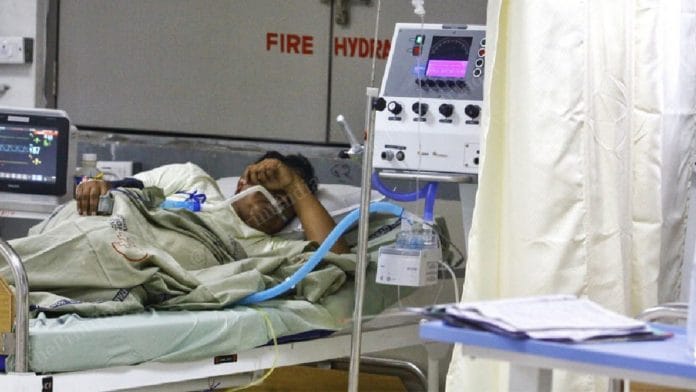New Delhi: As the coronavirus pandemic continues to infect thousands of people every day across the world, scientists strive to unravel new insights into the virus and how it affects humans.
Here are some of the recent scientific findings around Covid-19:
One in 100 Covid-19 patients may develop punctured lung
At least one in 100 patients hospitalised with Covid-19 develop a ‘punctured lung’ — a condition known as pneumothorax — according to a study led by researchers from the Cambridge University.
Pneumothorax is a condition typically affecting very tall young men or older patients with severe underlying lung disease. It is caused by damage to lung tissues leading to a puncture. This causes air from the lungs to leak and gather in the cavity between the lung and chest walls, and eventually leads to a lung collapse.
The team found several Covid-19 patients developing punctured lungs, even though they did not fall into the usual categories of people who develop this condition.
The study, published in the European Respiratory Journal, looked at data from 16 hospitals and found this condition occurring at a rate of 0.91 per cent.
Just under two-thirds (63 per cent) of patients with a punctured lung survived, found the study. Individuals younger than 70 years tended to survive, but older people saw poor outcomes.
Also read: Scientists flag gaps in Lancet study that claimed success of Russian Covid vaccine Sputnik V
Scientists design antiviral proteins that may help fight Covid
Small proteins designed using computers by scientists at the University of Washington have now been shown to protect lab-grown human cells from SARS-CoV-2.
In a study published in the journal Science, researchers noted that a candidate called LCB1 rivaled the best-known SARS-CoV-2 antibodies.
Its efficacy is now being evaluated in rodents.
The synthetic proteins were designed from scratch, which helped produce what the team claimed are some of the most potent antivirals, including LCB1. According to their study, LCB1 is roughly six times more potent than the most effective monoclonal antibodies reported so far.
To confirm that the new antiviral proteins have attached to the coronavirus spike protein, the team collected snapshots of interaction between the two molecules by using cryo-electron microscopy.
Low cost chip can measure Covid-19 antibody levels
Scientists at the Okinawa Institute of Science and Technology Graduate University (OIST) have developed a rapid, low-cost chip-based antibody test that provides results within 30 minutes.
The device, described in a study published in the journal Biosensors and Bioelectronics, uses portable technology to accurately measure the concentration of antibodies present in diluted blood plasma.
Antibody tests are an important means that can help understand the extent of the spread of coronavirus and guide public health policies.
While existing tests for antibodies are accurate and reliable, they are costly and need to be carried out in a lab by trained operators, the researchers said.
The new antibody testing device uses a powerful light-sensing technology. The chip provides results within 30 minutes and can detect even the lowest clinically-relevant antibody concentration.
Each chip is cheap to manufacture and negates the need for a lab or trained operators, increasing the feasibility for nationwide testing, according to the researchers.
Also read: Vitamin D supplement calcifediol could reduce death risk in Covid patients, Spanish study says
New scoring method can help predict death risk in patients
Scientists have developed a simple scoring method — known as the 4C Mortality Score — that can help predict the risk of death in adult Covid patients who have been hospitalised.
According to a study published in BMJ, the 4C (Coronavirus Clinical Characterisation Consortium) Mortality Score outperforms existing scores and can be used to support treatment decisions.
It uses readily available data to accurately categorise patients as being at low, intermediate, high, or very high risk of death.
To develop the model, the team collected data from 35,463 adults with Covid-19 in the United Kingdom, between 6 February and 20 May 2020.
Parameters included age, sex, number of underlying conditions (comorbidities), respiratory rate (number of breaths per minute), blood oxygen concentration, level of consciousness, urea, and C-reactive protein (a chemical linked to inflammation).
These were then entered into the model to give a score ranging from 0-21 points. Patients with a score of 15 or more had a 62 per cent mortality, compared to 1 per cent mortality for those with a score of 3 or less.
Covid response may cost nations lot more than thought
It will cost low and middle-income countries (LMICs) around $52 billion — equivalent to $8.60 (approximately Rs 632) per person — over four weeks to provide an effective healthcare response to Covid-19, assuming each country’s infection rate remains unchanged, according to a new modelling study.
Published in The Lancet Global Health journal, the study estimated that the costs of Covid-19 response in the health sector is likely to further increase if transmission spikes — rising to as much as $15 (approx Rs 1,101) per person over four weeks.
This is in contrast to recommendation of the Global Health Risk Framework for the Future, which states that $ 4.5 billion each year — equivalent to 65 cents (approx Rs 48) per person — should be spent by the world on pandemic preparedness in 2016.
The study, however, says that each country’s transmission rate was assumed to be constant. The ability of individual-level measures, such as contact-tracing, quarantine and use of cloth masks, to slow transmission of the virus was not taken into account. So the actual costs for countries could be lower.
Also read: Indian scientists discover ‘dance’ of Covid spike proteins, could help design vaccines






